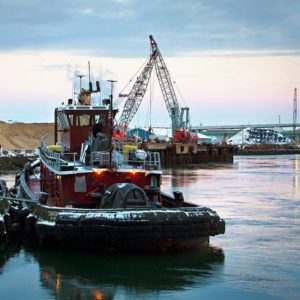The maritime industry is a vital economic anchor in New Hampshire and an integral part of life for many in our region. The area’s waterways have played a key role in advancing our country’s Navy for hundreds of years and the maritime industry is responsible for nearly 500 jobs and $43.6 million annual GDP in the state of New Hampshire. The goods that travel to and from the state through our waterways make our New Hampshire an economic leader. It is critical to the future of our local businesses that we continue to foster the industry’s growth and as a result, we must ensure that vessels that operate in our state and along our coast are doing so as efficiently and safely as possible.
Ballast water is essential for the safe operation of ships, and this critical element of maritime commerce is often overlooked. The management and discharge of ballast water is a careful, deliberate process that happens tens of thousands of times every day across the country and here in New Hampshire, allowing our ships to operate safely and goods to get where they need to be. But under a confusing patchwork of state and federal regulation, vessels on our waterways are currently subjected to inconsistent and prohibitive ballast water discharge rules.
The Vessel Incidental Discharge Act (VIDA), a measure currently being considered by Congress, would create a uniform, federal policy that ensures vessels operating, not just in New Hampshire, but in every waterway across the country, are required to meet the highest standard of environmental protection when discharging ballast water.
VIDA removes the confusion and uncertainty that exists today caused by the dozens of overlapping regulations currently governing ballast water discharge. Instead, VIDA enables two federal agencies, the U.S. Coast Guard and the Environmental Protection Agency, to work in cooperation to set and enforce the highest standards of ballast water discharge. These two agencies will have a collaborative relationship, with the Coast Guard as enforcer of the rule and the EPA working to ensure that we are using the best possible ballast water treatment methods to protect waterways in New Hampshire and across the country.
Right now, the patchwork of varying requirements across dozens of states and municipalities is actually slowing the implementation of advanced ballast water treatment systems and other equipment on many vessels. VIDA will ensure that the highest standards are required across the board in a uniform way, enabling vessel owners to confidently invest in and install the most effective treatment systems to protect our waterways. Speeding up the implementation and use of ballast water treatment systems is critical to protecting our waterways and VIDA will allow just that. Furthermore, VIDA ensures that the highest environmental standards are met not just now, but well into the future by establishing a process to raise standards as technology evolves.
The Department of Defense has been using the same standard that VIDA establishes for several years now. DOD maritime navigation is a vital part of our region’s economy and DOD vessels travel the same waterways as the private vessels that would be required to meet VIDA’s uniform standards. We have the greatest military in the world that is held to the highest standards. Those same standards are embraced in VIDA and should be met by the private vessels who share the water with our DOD vessels.
Senators Shaheen and Hassan should support VIDA and encourage their fellow senators to do the same. Currently, the bill has 23 cosponsors from both political parties, making it a rare piece of bipartisan legislation. It will lead to continued strength in New Hampshire’s maritime industry and the jobs it supports.
VIDA takes a commonsense approach to the important task of protecting our waterways and making sure the vessels that operate on them meet the highest standards. We are counting on Senators Shaheen and Hassan to help get this important legislation across the finish line for New Hampshire.




